Sustainability Reading Recommendations
Do you want to learn more about sustainability, or just want a good book with environmental writing? The staff and interns in the Office of Sustainability have compiled a list of our favorite sustainability books to inspire you to dig in and further your knowledge in new ways. If you’re interested in engaging with the world with new eyes and delving into literature about sustainability, look no further! To suggest a book for the list, e-mail green@olemiss.edu.
Braiding Sweetgrass by Robin Kimmerer
Recommended by Intern Rachel Anderson
Tags: Indigenous wisdom, scientific knowledge, spirituality, personal narrative

A New York Times bestseller, Braiding Sweetgrass is a deep reflection on and a lesson about our relationship to the environment. Office of Sustainability intern Rachel Anderson says, “Braiding Sweetgrass blends indigenous values of reciprocity and caring for all living beings with scientific and spiritual knowledge that the author has acquired as an ecologist and lover of plants. This is a deep, thoughtful work written by an incredible Indigenous woman!”
The Hour of Land: A Personal Topography of America’s National Parks by Terry Tempest Williams
Recommended by Sustainability Fellow Jade Chalkey
Tags: conservation, personal narrative, non-fiction
Throughout this book Tempest explores America’s National Parks, a place of refuge for many amidst the everyday environmental degradation occurring around us. Tempest brings the reader along on a ride that questions the role of the environment in our lives, and our role of stewards of the earth. Sustainability Fellow Jade Chalkley says “ One of my favorite environmental authors and books! Terry Tempest Williams showcases the National Parks in a completely different way highlighting the people and the human stories that make these parks apart of a larger American identity. This is an amazing read if you are looking for a new take on conservation and historical environmentalism.”
The Home Place: Memoirs of a Colored Man’s Love Affair with Nature, by Drew Lanham
Previous Green Week Keynote Speaker
Tags: Conservation, Race, Intergenerational Story, Non-fiction, Memoir
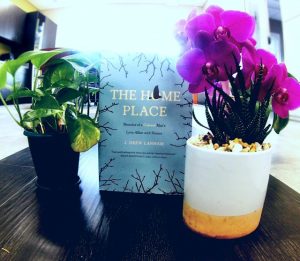
Drew Lanham, our 2019 GreenWeek Keynote speaker, narrates a rich story about nature and belonging in the American South. Sustainability Fellow Jade Chalkley says, “An insightful and engaging read, Drew Lanham provides a beautiful overlap between race, society, and the natural world. Told from the perspective of an experienced naturalist there is a perfect mix of personal anecdotes and scientific knowledge as Dr. Lanham walks you through the story of his life.”
The Third Plate, by Dan Barber
Recommended by Intern Brenna Gardner
Tags: Food Systems, Ecology, Farming, Non-fiction, narrative
Office of Sustainability intern Brenna says, “Barber explores the past, present, and future of local food systems, asserting that one key in creating a more sustainable food system is changing how we conceptualize food and what constitutes a meal. Proposing his idea of the “third plate” Barber takes the reader on a historical, ecological, and personal journey. The pages are teaming with Barber’s love of good food and passion to create a sustainable future, creating an inspiring read for those interested in the future of food.”
Ecotopia, by Erest Callenbach
Recommended by Sustainability Fellow Jade Chalkey
Tags: Fiction, Dystopian, Futuristic
The futuristic and ecologically sound world portrayed in Ecotopia, a novel published in 1975, provides as much hope and allure as it did four decades ago. Jade says “This was a book I received as an undergraduate graduation gift and remains one of my favorite environmental fiction books. The book is written from the perspective of an American journalist in a future where America has been split between the east and west. The east has developed into a society working against nature and the west has developed working with nature. An interesting perspective of what the future would look like from the 70s and a very short and thought-provoking read.”
The Overstory, by Richard Powers
Recommended by Intern Brenna Gardner
Tags: Fiction, Narrative, Activism, Ecology
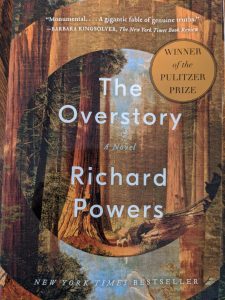
Winner of the Pulitzer Prize for Fiction, The Overstory is a novel with individual chapters who at once appear on their own, but eventually are all interwoven into a much grander story. Brenna says, “The storytelling in this book in The Overstory is beautiful and compelling. Powers writes in a way that is illuminating, probing us to dig deeper in the richness and interconnected way that nature links us to one another. I would suggest this to anyone who loves fiction and intricate plots.”
Losing Earth: A Recent History, by Nathaniel Rich
Recommended by Intern Megan Stubbs
Tags: Non-fiction, Historical, Climate Change
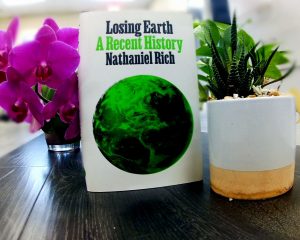
Following the story of individuals dedicated to campaigning to convince the world of climate change, Nathaniel Rich has created an incredible, accessible history of the political and scientific climate of climate change. Office of Sustainability intern Megan Stubbs says, “Rich tells the story of climate change in an intimate way by focusing on actors. This book is about the existence of scientific evidence for global warming and the decades it was politically denied, as well as the eventual damage that will occur as a result.”
Falter: Has the Human Game Begun to Play Itself Out?, by Bill McKibben
Recommended by Sustainability Fellow Jade Chalkey
Tags: Non-Fiction, Climate Crisis, Current Issues, Scientific Knowledge
Written by acclaimed environmentalist, journalist, and author Bill McKibben, this book is a sobering look at where humans stand in relation to climate change, and what our role is in combating it. Sustainability Fellow Jade Chalkley says, “Falter is a great description of the historical and current scientific data about climate change presented in a straightforward, direct way. Bill McKibben is a very prominent American environmentalist who presents hard information with dark humor and facts.”
The World Without Us, by Alan Weisman
Recommended by intern Megan Stubbs
Tags: Non-Fiction, Human Impact, Climate
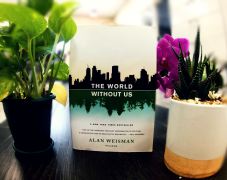
In this narrative Weisman delves deep and explores the earth’s capacity for healing if given the right conditions, prompting the reader to consider our role as a species. Megan says, “This is an exciting non-fiction book about what would happen to the natural and built environment if humans suddenly disappeared, presented in a very thought-provoking manner.”
Storming the Wall: Climate Change, Migration, and Homeland Security, by Todd Miller
Recommended by Intern Lennis Barlow
Tags: Climate Change, Climate Refugees, Border Industrial Complex
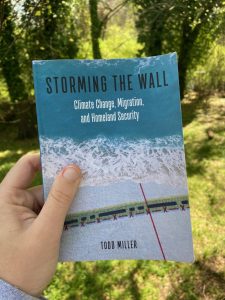
Lennis says, “Storming The Wall is an incredibly helpful book in seeking to understand the institutions which create the largest environmental impact and their efforts to protect against its human repercussions. The author travels throughout the world (the US-Mexico border, the Philippines, Paris etc) to interview climate refugees, attend government security conferences, and border security technology expos. Through his experiences, he presents the somewhat bleak picture of inequality in creating and addressing global climate issues.”
The World We Have, by Thich Nhat Hanh
Recommended by Intern Molly Longton
Tags: Philosophy, Wisdom, Ecological Thinking
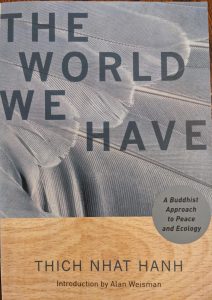
Acclaimed spiritual leader, activist, and poet Thich Nhat Hanh delves deep into solutions to many of the world’s social and ecological problems, offering the reader a way to conceptualize the earth and connect on a deeper level. Molly says, “This is a really awesome book about how you can apply buddhist practices to your everyday life, especially with regards to living a more eco-friendly lifestyle while forming a deeper connection with the world around you.”
Desert Solitaire: A Season in the Wilderness, by Edward Abbey
Recommended by Intern Rachel Anderson
Tags: Non-fiction, Philosophy, Environmentalism
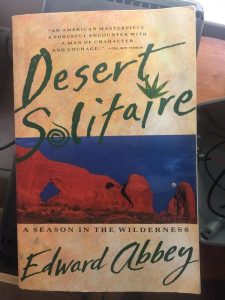
In this book Abbey recounts his time as a park ranger in the Moab desert, creating a beautiful narrative and ode to the natural world. Rachel says, “This is my all time favorite book. No one loved the western landscape more than Abbey. He’s a very passionate and interesting writer who makes you want to go to the desert and never come back.”